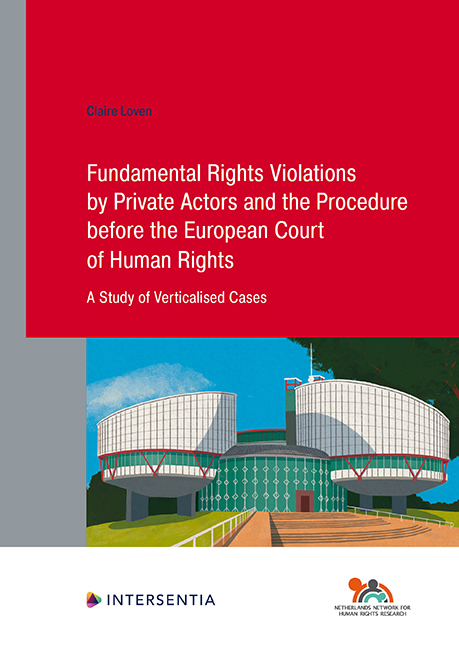 Fundamental Rights Violations by Private Actors and the Procedure before the European Court of Human Rights
Fundamental Rights Violations by Private Actors and the Procedure before the European Court of Human Rights Published online by Cambridge University Press: 29 February 2024
INTRODUCTION
In a speech marking the Convention's 70th anniversary in autumn 2020, former President of the Court Sicilianos described the Convention system as a ‘unique international instrument’ that ‘has developed an unparalleled dynamic in its 70 years of existence’. Cases coming before the Court that originate from a conflict between private actors at the domestic level, termed ‘verticalised’ cases in this study, are a notable aspect of this unique system, making up a large share of the Court's case law. This has been illustrated throughout this study, starting with the case of Von Hannover (No. 2) in Chapter 1. The applicants in this case, Princess Caroline von Hannover and her husband, had first brought domestic proceedings against several publishing companies to prevent the (further) publication of photos of their private life, and then complained before the Court about the lack of adequate State protection of their right to respect for private life (Article 8 ECHR). In other words, a case between two private actors (i.e. a ‘horizontal’ case) at the domestic level transformed into a case between an individual and the State (i.e. a ‘vertical’ case) at the Court. The case of Von Hannover (No. 2), involving a conflict between the right to reputation and private life and the right to freedom of expression of two private individuals, is just one example of a verticalised case. Cases about family life, cases about the relationship between an employee and an employer, and cases related to one's surroundings – such as a case about serious health damage caused by a privately owned factory's emissions – are other examples of cases coming before the Court that can originate from a conflict between private actors at the domestic level. For example, a conflict at the domestic level between separated or divorced parents about custody or access rights can transform into a case between an individual and the State if one of the parents complains at the Court about the State's failure to enforce the custody agreement.
This tendency towards ‘verticalisation’ can be explained by Article 34 of the Convention, which contains the right for individuals to petition to the Court. Under this provision, complaints have to be directed against one of the Convention States to be admissible. Accordingly, complaints directed against private actors are incompatible ratione personae with the provisions of the Convention.
To save this book to your Kindle, first ensure [email protected] is added to your Approved Personal Document E-mail List under your Personal Document Settings on the Manage Your Content and Devices page of your Amazon account. Then enter the ‘name’ part of your Kindle email address below. Find out more about saving to your Kindle.
Note you can select to save to either the @free.kindle.com or @kindle.com variations. ‘@free.kindle.com’ emails are free but can only be saved to your device when it is connected to wi-fi. ‘@kindle.com’ emails can be delivered even when you are not connected to wi-fi, but note that service fees apply.
Find out more about the Kindle Personal Document Service.
To save content items to your account, please confirm that you agree to abide by our usage policies. If this is the first time you use this feature, you will be asked to authorise Cambridge Core to connect with your account. Find out more about saving content to Dropbox.
To save content items to your account, please confirm that you agree to abide by our usage policies. If this is the first time you use this feature, you will be asked to authorise Cambridge Core to connect with your account. Find out more about saving content to Google Drive.